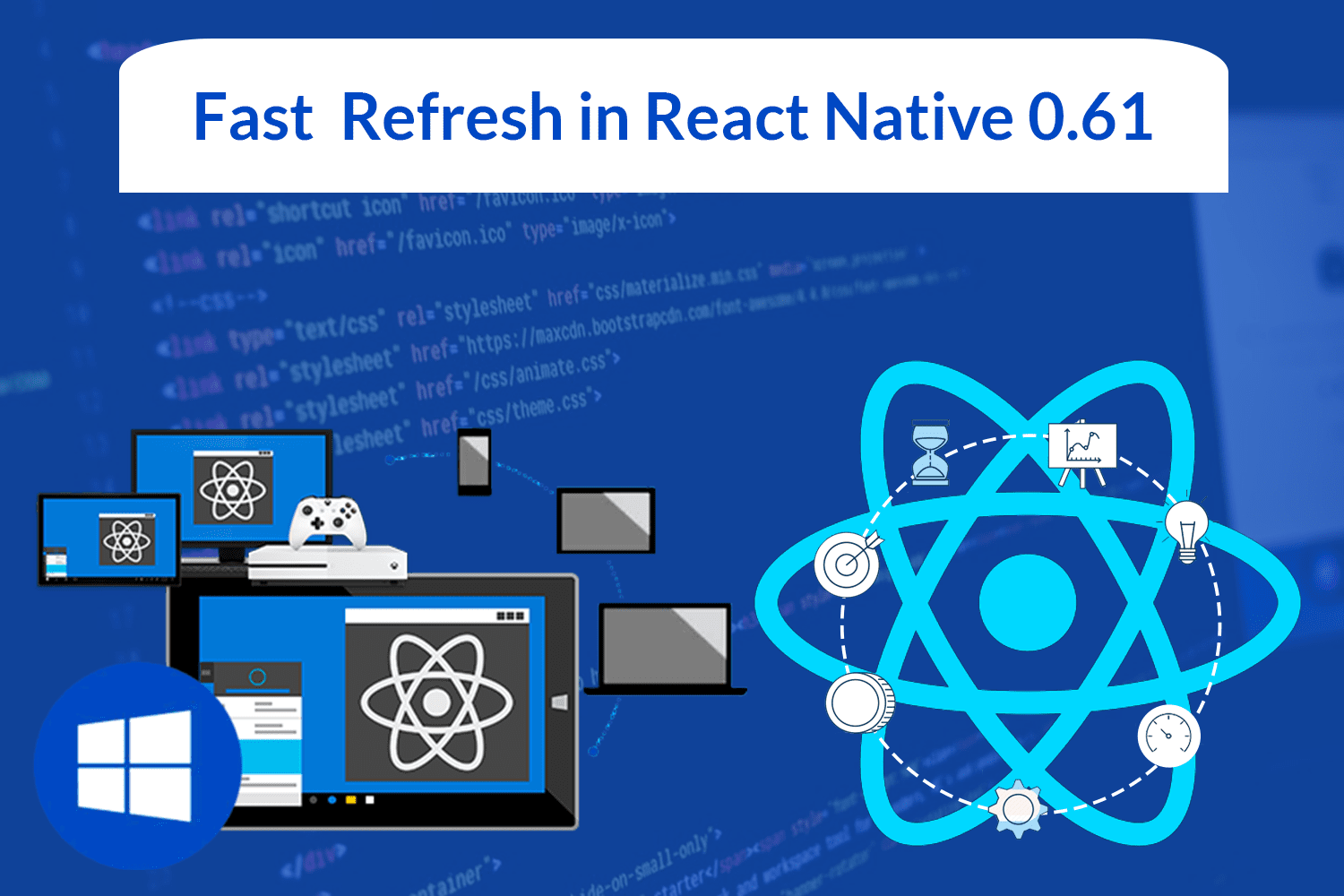September 5, 2020 | The Latest Update That’s Reinventing ReactJS Development- Fast Refresh in React Native 0.61

React Native eradicated the problem of coding separately for different platforms with the ‘Write Once, Run Anywhere’ (WORA) technique, thus making the process of mobile app development faster. Moreover, there were some nagging issues, but with React Native 0.61, the app developers will have a sigh of relief. In the fast-paced world, businesses are aiming to build a glitch-free app that runs seamlessly on multiple platforms and connects the target audience worldwide.
Constant evolution has become the nature of today’s tech-driven world. Thus tech organizations are doing every bit to keep their app developers updated with all the latest happenings so that they can translate that into their work. The increase in demand has made it a necessity for the app development companies to look beyond the native apps. Native mobile apps are prolific but can be just used in a particular manner. Going native way and developing the apps for different platforms is a time-consuming and expensive option that never lets the businesses get their idea built within budgets and time. That’s where cross-platform development is an ideal solution that ends up the need to separately code for each platform from scratch.
As per the release note here are the 3 major updates:
- Whole new hot reloading experience, called “Fast refresh”. It is turned on by default and can be accessed under the developer menu.
- React version has been updated to 16.9
- Better CocoaPods support with use_frameworks
After reading all the 3 points you can understand what is new but in this post,
What’s more? React Native has realized them all and provided a solution to address all those problems in the form of React Native 0.61 Version.
To know more about the new features and the changes React Native does in the 0.61 version. Let’s dig deeper!
Users will now be able to optimize the existing features of React Native 0.60. The update comes free of bugs found in the previous update and comes bearing new improved features that are all mentioned in the React Native 0.61 documentation. A couple of months back React Native team made gala announcements about React Native 0.61 that comes with new additions, deletion, breaking changes, and bug fixes. The developers can effortlessly optimize the React Native 0.60 features.
- React Native provides improved CocoaPods support
The previous version of React Native had some default updates and support for Cocoapods, but it created a ruckus during the usage of frameworks. .CocoaPods integration by default is made possible in the 0.60 upgrades with some updates for implementing React Native in iOS projects, which need development with dynamic frameworks. However, it’s breaking the builds leveraging use_frameworks.
-
New useWindowDimensions Hook
Apart from using the dimensions API in the majority of the cases, with React Native 0.61, the mobile app developers can opt for useWindowDimensions. The automatic updates will enable the app developers to work on the newest windows version and thus be compatible with all the changes. This new feature named Hook offers and subscribes to dimension updates. It can also be used in the place of the Dimensions API in most cases.
-
React upgraded to 16.9z
It provides and subscribes to new dimensions in an automated fashion. Also, in some cases, the hook can be used in place of dimensions API. The new version doesn’t support the UNSAFE_ lifecycle methods, includes improvements to act, and so on. The improvements suggested will help the app developers to come up with usernames that cannot be easily detected by the hackers and thus making the codes safe from any malware or suspicious activities.
-
React .xcodeproj. removed
By removing the xcodeproj, React Native 0.61 makes it possible for the app developers to integrate RN into iOS mobile apps. With the 0.60 version release, the auto-linking support with CocoaPods, and CocoaPods integration in e2e test runs are introduced. That’s why the support for React .xcodeproj is no longer required and it’s removed in the 0.61 upgrades. The subtle integration of RN into iOS apps will effectively depreciate the React. xcodeproj support so that the concerned file can be easily removed.
-
Fast Refresh-
The existing “Live Reloading” and “Hot Reloading” features into a single new feature called “Fast Refresh” and it was made from scratch. It was anyhow high time for the react native development team to look into the issue of hot reloading and fix it with something smoother. The Hot reload function does not work properly with the Stateless Functional Components (SFC). With the fast refresh, the app developers have addressed the issue and made React Native competent with all the modern updates.
Some points that React Native Developers must know about-
- Fast Refresh supports a new version of React Native, including function components and hooks
- Fast Refresh preserves React local state in function components
- If you need to reset the React state on every edit, you can add a special // @refresh reset comment on the file with that component.
- Fast Refresh always remounts class components without preserving the state. This ensures it works reliably.
- Adding a console.log or a debugger statement during edits is a neat debugging technique.
- Fast Refresh preserves React local state in function components and Hooks by default.
- Developers can reset the React state on every edit, by adding specific command on the file with that component
- Fast Refresh always remounts class components without preserving the state
- Fast Refresh automatically detects errors in the code. Developers thus won’t have to reload the app manually after fixing a syntax or a runtime error.
Let us understand in what way React Native 0.61 will help the mobile app developers and positively impact the mobile app development process. The dynamic frameworks will help in setting a strong foundation for the mobile app development process, thus resulting in fruitful outcomes.
Take a sneak peek inside at React Native’s continuous issues
- The developers show reluctance towards the monotonous and time-expensive upgrade process of React Native to a higher version. Besides, it becomes a back-breaking task when developers try to incorporate all the upgrades at once.
- Finding the major cause of the exception is a hard nut to crack in. Even, componentDidCatch won’t help at scale.
- The hot reloading- the most fascinating feature of React Native that reload the code without needing to reload the entire app doesn’t work well with Stateless Functional Components. Also, it shows zero tolerance for typos and mistakes.
- The resilience power of React Native is not too strong, that’s why the React Native apps can be crashed easily. Also, it doesn’t provide much information about the app crash.
- Due to the small-scale connected community, the Ram bundle of React Native is not much strengthened by the OTA programs like- CodePush.
However, Developers have agreed after some testing that Fast Refresh is highly reliable along with being flexible. We cannot say it’s easy to put react Native in a position where you need to reload manually. Fast Refresh works perfectly for both class components and functional components and some even believe it may update faster.
In this blog, we had discussed Those are all of the changes that you are required to make for all projects, however, there are a couple of other breaking changes that might affect some apps. You should read through the changelog to see if anything applies to your project. You should also go through the libraries you use to see if any upgrade is required.

 .Net
.Net Vue.js
Vue.js Twilio
Twilio Postgre
SQL
Postgre
SQL PHP
PHP React.js
React.js Bootstarp
Bootstarp MySql
MySql Laravel
Laravel Woo
Commerce
Woo
Commerce Firebase
Firebase SQL
Server
SQL
Server Angular
Angular Python
Python ChatBot
ChatBot Wordpress
Wordpress Node.js
Node.js Full
Stack
Full
Stack MongoDB
MongoDB Drupal
Drupal





















